

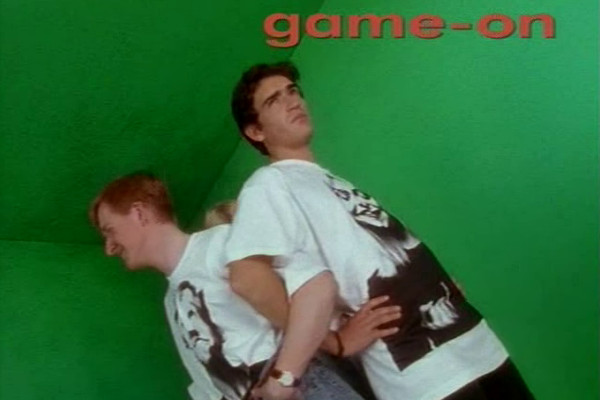
The sitcom celebrates its thirtieth anniversary next month, so what better way to celebrate than a look back over the first series? Game-On is available on DVD from Amazon, but in the meantime, please join me as I rank the first series from worst to best...
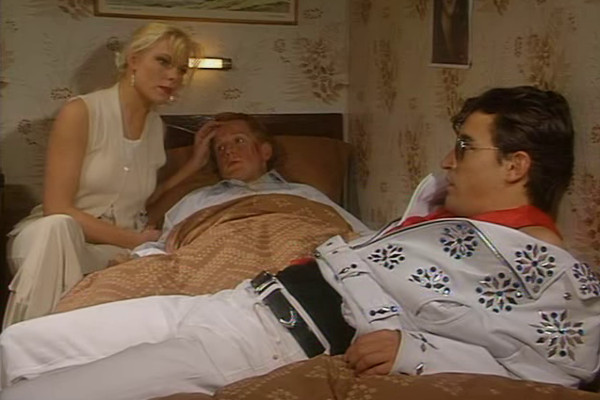
First things first: Game-On, and not Game On? While the end credits and the DVD releases call it "Game On", and I'll probably mention it a couple of times so the article gets picked up by search engines, check the screen shot of opening credits, above. Game-On it is. It's a kind of "Mandela Effect" for TV trivia, similar to how people referred to "The Paul Daniels Magic Show", despite it actually being titled just Paul Daniels for over thirteen years.
If you haven't seen the show, or have forgotten, then there's also the question what was Game-On? A sitcom involving sexually active Mandy Wilkins (Samantha Womack, nee Janus) sharing a flat with her best friend's younger brother, the sexually inactive Martin Henson (Matthew Cottle). What gives the sitcom its core and a different edge is that the flat is owned by Martin's best friend and former schoolmate, Matthew Malone (Ben Chaplin). Malone never leaves his flat, and his agoraphobia is eventually revealed to be something far darker and more neurotic than first suspected.
As for this article celebrating the show's "30th anniversary", then how is this possible when it aired from February-April 1995? Well, it's not the 30th anniversary of the show being aired, but it is the 30th anniversary of it being made. Game-On had a fairly long wait to reach the screen, with the first series recorded between 21st February-24th June 1994. Heavily studio-bound, fittingly so given the core concept of agoraphobia, just three days of outside broadcast filming were scheduled, from 28th-30th March 1994.
Before we really dig into the series, let's finish this opening entry with a bit of trivia. Most of the programmes shown in the series (Matthew compulsively watches television) aren't entirely contemporary with the show, most of them being a couple of years old. However, while most of the clips, featuring gardening shows and the like, are real, there are also some fictional shows being watched, after a fashion.
While stock footage is shown on the television, voice artists are used to portray "American teenagers", to give the impression that Matt is watching a US soap. The two voice over artists for this edition are Chris Lang and impressionist Alistair McGowan, both uncredited, while most of the other episodes from this first series also feature uncredited vocal performances from Jan Ravens.
Finally, this is the TV debut of Zawe Ashton, who played one of the schoolgirls who bullies Martin, aged just 9. The ratings for this edition are unavailable, though were below 4.05 million.
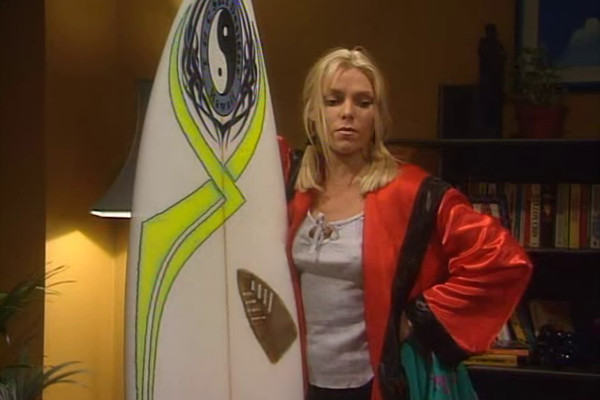
One thing that can't be avoided with the first series of Game-On is the completely messed-up continuity. This first episode ends with - spoiler - Mandy having accidentally left an iron mark on Matthew's surf board... which is then followed by episodes where the burn mark disappears.
For completeness' sake, then Matt is walking with it and it's discussed during The Great Escape, and it can be seen, undamaged, in his room during Bad Timing. As two of the episodes don't feature it at all, then only Matthew - A Suitable Case for Treatment can be truly considered "post" this one, as it features a scene with Martin referring to Mandy having burnt the surfboard.
The strangest part is, fate wiped away this continuity error, with it originally being pushed back in the running order and screened fifth. The major reason for this is reportedly because it features Mandy dating a boxer, and worrying he could be knocked out and enter a coma... two days before broadcast Gerald McClellan entered a coma after a televised fight with Nigel Benn.
Only when McClellan was back in a stable condition was the episode shown, but it was pulled so late from the schedules that it was reviewed the following day by Matthew Bond in The Times, seemingly working off a preview copy. (Bond, incidentally, said the show was well acted and had potential, but was generally lukewarm, claiming it was: "a modest reworking of [...] Men Behaving Badly, with a liberal scattering of Wayne's World and Beavis and Butt-Head thrown in.")
Repeat runs and the DVD release have seen this one go out first, but it's debatable whether or not it's a good first episode, continuity notwithstanding. In terms of establishing the characters, then it sets up Martin from the outset, and it also serves as a strong introduction to Mandy. But while we get a sense of who Matt is, and it's a funny episode, there's only a brief tease from Martin about Matt never leaving the house.
At this stage it's not clear that this is a long-time thing, or that there's any real reason behind it, but instead just the implication that Matt is a little lazy. Other than, perhaps, the revelation that Mandy was a bedwetter until she was 13, there's no real suggestion that this is anything other than the typical flatshare sitcom described by Matthew Bond, no real "x factor" to suggest that it was something a little different.
Definitely "of the time" are some of Matt's prejudices, be it racial or sexual, but these just seem to be a mask for his own insecurities. One regular criticism of Game-On from reviewers is that it's so clearly set in the '90s. But while there are routines based around Matt impersonating Michael Madson from Reservoir Dogs, or playing songs by the Manic Street Preachers, such things are odd criticisms to have, as the show was made for a mid-90s broadcast, not to be dissected and analysed thirty years later by TV nerds with too much time on their hands. (Wait, what...?)
Being pushed back in the schedule benefitted this one with the audience, the growing popularity of the series seeing it reach fourth in the BBC2-only chart with 4.11 million viewers.
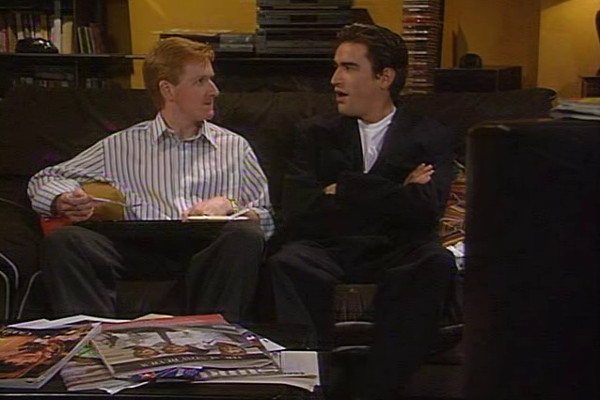
Every episode of Game-On has something that would trouble modern sensibilities. Such a thing is not unique to Game-On, though for some reason gets brought up more in discussions regarding it. Perhaps it's that shows from the '60s-'80s had more of an excuse to be "of their time", and that Game-On, made in an age where the term "political correctness" had begun to enter the public consciousness, was a little shocking even when it aired.
This episode's paean to the world of futuristic offence is to popularise a term for PMT, with Matt insisting that Mandy is "on the blob". Yet while Mandy sleeping with men is one of the show's main jokes, it's not quite as surface level as it may appear. With the show co-written by a woman, this is the episode where we learn that the educated Mandy has a degree and an IQ of 139, and sleeps with men largely out of self loathing. There's also added neuroses with the aforementioned late-age bedwetting.
Yet perhaps the element that makes it clearest that this is a series the best part of thirty years old comes with Martin talking about finding a girl on the TV attractive, only for Matt to tell him "She's about 12, man." Undeterred, Martin talks about how "she could have me in her Wendy House", getting a fist bump from Matt in return. Although a relatively similar routine appeared in The Inbetweeners, the ages of the characters in that series were supposed to be 16 year olds, whereas Martin turns 23 in this episode, creating an even more unsettling air in hindsight. The last episode of the first series, Fame, also sees Matt talking about a fantasy life of sleeping with underage girls and doing designer drugs, and Martin talks about him being on a school bus with 13 year olds.
Those looking for serious Game-On continuity may note that Martin's mother has left him a frozen meal with "Tuesday 27th" written on it. In 1994 when it was shot, the 27th fell on a Tuesday only in September and December, while in the year of broadcast it fell only in June. The September date perhaps makes most sense of Ron Grimshawe (guest star Dave Hill) making the claim that it's "cold out for time o' year". On the other hand, it's possible that those making Game-On weren't anally obsessive about such details, and the props department possibly didn't even discuss the label with the writers.
This is, incidentally, the only series one episode where the colour of Martin's hair is mentioned. The Great Escape has Matt refer to Chris Evans on TV as an "ugly ginger tosser", but with no particular reaction from Martin, or realisation from Matt that it's also the hair colour of his best friend. While the second series had so many ginger references it became a regular theme (57 references, should you care), this episode's "shut up, Ginge" is the sole example of it coming from the Ben Chaplin version of Matt.
Away from dark content and nerdy observations, the most significant part of this episode is the scene, pictured above, where Martin questions whether "asexual" means "a sexual dynamo"... causing Ben Chaplin to nearly break character and having to take a moment to compose himself. It's a charming moment, a "goof" left in the show, with Chaplin then delivering his next line with a crack in his voice.
This was the second episode, elevated to first after Big Wednesday was pulled at late notice. With a lot riding on a new sitcom, it scraped to 153rd place in the charts with 3.7 million viewers, 1.34 million BBC2 viewers switching off before it came on.
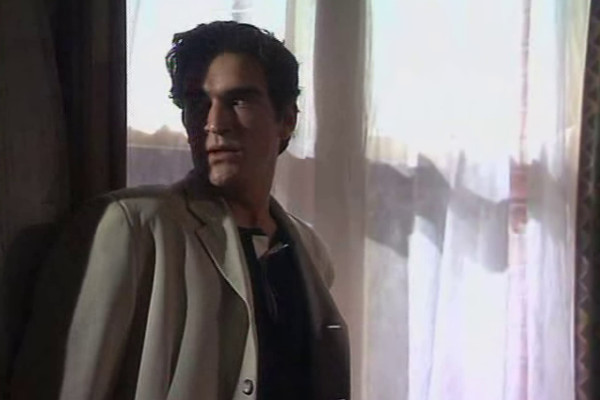
While the second series of Game-On went for elaborate episode titles (Slime Surfers & Jissom Monkeys as an example), and the third largely functional ones (Laura, Wedding Day on DVD listings, just Episode One, Episode Two onscreen...) the first series takes all its titles from the names of films. In fact, this is the only one to change the title slightly, as it's a nod towards the 1961 movie Morgan – A Suitable Case for Treatment.
Although this is far from the funniest episode of the series, it's one of the darkest. While other episodes focus on what Mandy and Martin do in their day while Matthew essentially has no function in the plots, this one has Matthew as the lead character, performing large chunks of the episode alone. It's here that we learn that his unwillingness to leave the flat isn't just laziness, but is something deeper, and has been carrying on for six months. It's also here we learn that his father used to beat him as a small boy, and that his father was also killed in a car crash.
Recorded as the fifth episode, it was eventually broadcast second, and again for the 1996 repeats. It was only when it was released on DVD that it resumed its intended fifth position, and it could be argued that it doesn't work as an early episode. There's too much given away, the mystery undercurrent of the first series not given in small clues like the planned order had it. (If we want to really dig deep, then The Great Escape, shown fourth, has Mandy owing £2000 for six months' rent, while this one has her outstanding rent given as an estimate of £2000-£3000.)
This is the episode where Mandy catches Matt asleep in her bed, wearing her underwear, and it's a sight that some find hard to come to terms with in the 21st century. It also leads to another possible continuity point, in that The Great Escape sees Mandy talk about Matt sneaking into her room to play with her underwear. Matt glances over at Martin as if Mandy's revealing his secret, though The Great Escape should come before this one for surfboard and rent-related reasons. Maybe Mandy was just a really good guesser?
Mandy ends the episode by comparing their situation to Jean-Paul Sartre's Huis clos, and how all three of them are trapped in a co-dependent version of Hell. In one sense it's a little "on the nose" in terms of describing the basic set up, but in another it's an existential summary of their own fated lives.
For trivia, then the ratings for this one can't be traced (though were below 4.16 million) and a repeat in May the following year saw 2.91 million tune in.

Each episode of the first series of Game-On was shown directly after the Rik Mayall-Adrian Edmondson comedy Bottom. Yet not the third series which had ended its run in February, but the second series, being shown for the third time. While this run did, in fairness, feature a previously-unscreened episode ('s Out, delayed due to coincidental similarities with a topical news story in 1992) having the second repeat of a two-year-old sitcom considerably outperforming a new product is a little embarrassing.
While both Bottom and Game-On have their positives, they're not two sitcoms that particularly complement each other. It's arguable that the broader, louder second series of Game-On with a more over-the-top performance from Neil Stuke as Matt may have fitted better, but whereas Bottom lived in a somewhat operatic world two steps removed from ours, the first series of Game-On was more grounded and realistically coded. All, that is, apart from the fantasy and dream sequences which sometimes took place in episodes and open this particular edition. While a whimsical addition to some episodes, following the edgier events of Bottom, such fantasy sequences could seem quite twee, almost "safe".
The comparison may not have worked if the broadcast of the two shows was reversed, either - while Bottom could often be an amusing, violent show with a spectacularly over-the-top performance from Rik Mayall, it may have seemed overtly cartoonish had it followed the more relatively sedate Game-On. Yet such things are just speculation, and while this episode of Game-On was the fourth most-watched programme on BBC2 that week with 4 million viewers, Bottom was third with an extra 1.29 million.
The reordering of every single episode except for Fame meant that continuity was also slightly changed for this edition. Originally intended to air third, it opens with Martin dreaming of one of his German office colleagues, Renate (Kate McKenzie), before later confessing to Mandy that he has a crush on the colleague. The planned fourth episode, Bad Timing, features a shot of the colleague in real life, and Martin telling Matt about her. While the episodes are ordered as originally intended on the DVD release, Bad Timing was shifted to third place on original broadcast, with The Great Escape pushed back to fourth.
This meant that for viewers of the original run, they saw Martin tell Matt about his crush first, but did make slightly more logical sense in that when Martin dreams about Renate, it's a character we've already (briefly) seen and heard about, rather than a "cold open" with a character who's a complete stranger to us. Such things aren't continuity issues to the levels of burnt surfboards, and are more about personal preference, but it's intriguing how the flow of a series can be changed by having it mixed around in scheduling.
As for the episode itself, then overall it's a varied edition, with the most overt references to Matthew's condition to this point, and the first reference to suicidal tendencies. The key sequence comes towards the end, with a paranoid Matthew ordering Martin and Mandy out of the flat, before relenting in a fake out, then relenting for real. The vague philosophical underpinnings of the first series come to the fore as Matt muses over Martin trying to cheat fate, only to then get his own karmic balance by stepping into a hatful of sick. Game-On's need for a big "punchline" to see out episodes always felt a little artificial and not really borne of the episode, but the concept of predeterminism being placed around vomit in a bowler hat is something that helps to sell this moment a little better than most.
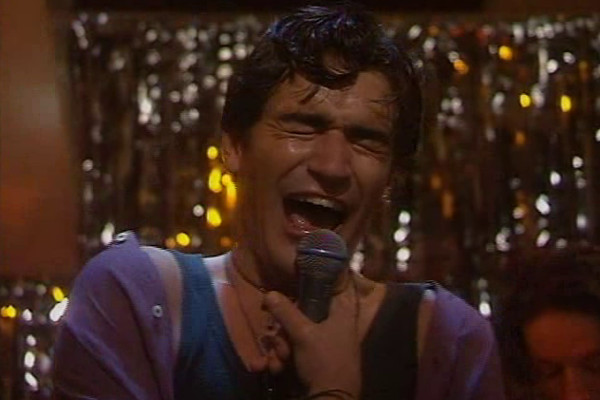
There's no real "bad" episode of this first series of Game-On, and the order here could be largely moved around, as most of them are of a similar quality. Yet Fame is the one where everything comes together. Where we learn that Matt's agoraphobia is even worse than suspected, and a result of his parents dying. Where he finally leaves the house, under duress, but it doesn't destroy the core concept of the series, but instead makes his situation even worse. Plus, it's the one where Martin reveals arguably the best-ever name for an unseen character: Wally Bazoum.
It's difficult to see where the show could have gone from here. Ben Chaplin was picked up by Hollywood and so was replaced by Neil Stuke for the second and third series, an actor who was reputedly the second choice for the role in the first place. The show could still be funny, but in a very broad, crass way. Whereas Game-On is often regarded as part of the "lad mag" culture of the 90s, this seems a very surface level reading, and in fact the show seems to be a deconstruction of such attitudes, at least in this first run. (Note that this episode actually features a ficticious lad mag as part of the story, derisorily named "Dogs Bollox".)
Yet while the Stuke era does provide laughs, it jettisons most of the depth - ironically, some of the most "laddish" sequences occur in the third and final series, which saw Bernadette Davis write it alone. Game-On isn't really mentioned in discussions of great sitcoms, and probably rightly so, but this first series is a different creation. The final two series did produce plenty of chuckles here at the Anorak Zone, but won't be covered in articles as there's no "meat on the bones".
Had Chaplin stayed with the series, would it have worked? There's a distinct tonal difference when someone physically imposing with Hollywood star looks is replaced by someone who doesn't look as if they could threaten Martin or convince him of their sexual conquests. So it becomes a show just about a goofy central character doing crazy things. It's also hard to imagine Chaplin performing some of the broader, crasser and more juvenile sequences, like getting sexually pleasured by a vacuum cleaner. Yet Matt's unknowing closeness to a gay character in series two would have been interesting to see with Chaplin in the lead.
Game-On was only ever a moderate hit, and this was its commercial peak: third in the BBC2 charts with 4.55 million tuning in. What followed had variable ratings: the third and final series averaged at 3.72 million viewers, though episode 2.6 was only just behind this one, with 4.54 million tuning in.
The entire first series is very much a mystery story, where we only really get towards the real reason of why Matt can't leave the flat in this final episode. Without the gradual unfolding of this story element, the series needed somewhere fresh to go, and it arguably didn't find it.
If you'd like to treat me to a coffee for this very anally retentive look at Game-On, then the button is below. But if you don't, that's fine too, and I hope you've enjoyed the article.